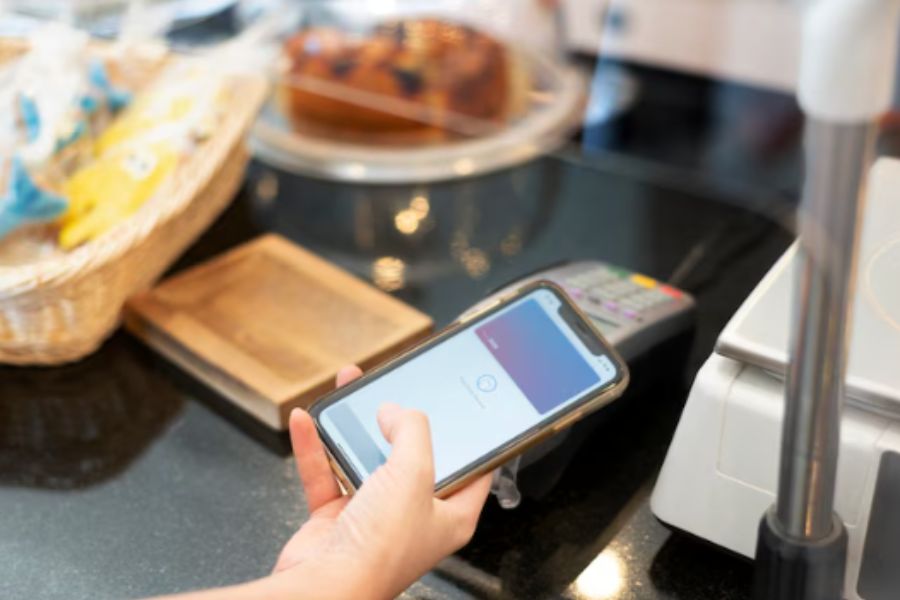The integration of a POS system ecommerce doesn’t just aim to increase revenue, but also to improve the customer experience, streamline operations, and encourage long-term growth. A POS system that is specifically designed for e-commerce can bridge the gap between online and offline channels, making transactions seamless, and enhancing overall business efficiency. With the focus on improving every aspect of the e-commerce journey for both merchants and customers, the system aims to go beyond revenue growth.
What is POS System Ecommerce?
A POS system ecommerce is a digital solution designed to facilitate the processing of orders or transactions across various sales channels in the online retail space.
Traditionally, POS systems were used primarily in physical retail stores, where they consisted of hardware such as cash registers and software to manage transactions. However, with the rise of ecommerce, businesses now require POS systems that can seamlessly integrate with their online stores.
Businesses may need to upgrade to an integrated point-of-sale system to bridge the gap between offline and online sales channels. This integrated POS system can handle both online and offline orders and transactions, providing a unified platform for managing sales across all channels.
In summary, a POS system for e-commerce serves as a digital solution that enables businesses to manage transactions across multiple sales channels, providing a seamless and integrated experience for both merchants and customers.
Integration with ecommerce platforms
- Unified inventory management
One of the primary advantages of integrating POS systems with ecommerce platforms is achieving unified inventory management. With this integration, businesses can maintain a single, centralized inventory database that is updated in real-time across all sales channels.
This means that whether a product is sold in-store or online, inventory levels are automatically adjusted, minimizing the risk of overselling or stockouts. By having a consolidated view of inventory, businesses can optimize stock levels, reduce carrying costs, and improve overall inventory accuracy.
- Synchronized sales data
Integration between POS systems and e-commerce platforms enables synchronized sales data, providing businesses with comprehensive insights into their sales performance. Sales data from both online and offline channels are consolidated into a single reporting system, allowing merchants to analyze trends, track customer behavior, and make informed business decisions.
By having access to unified sales data, businesses can identify high-performing products, assess the effectiveness of marketing campaigns, and optimize pricing strategies for maximum profitability.
- Seamless order fulfillment
POS system integration with e-commerce platforms facilitates seamless order fulfillment processes. When an order is placed online, the integrated system automatically updates inventory levels and triggers fulfillment processes, whether the order is fulfilled from a physical store or a warehouse. This ensures that orders are processed quickly and accurately, leading to improved customer satisfaction and retention.
Additionally, integration allows for better order tracking and status updates, keeping customers informed about the progress of their orders from purchase to delivery.
- Efficient customer management
Integration between POS systems and e-commerce platforms enables efficient customer management capabilities. Customer data, including purchase history, preferences, and contact information, are synchronized across all channels, providing businesses with a 360-degree view of their customers.
With this holistic view, businesses can personalize marketing efforts, tailor promotions, and provide personalized recommendations based on individual customer preferences. By delivering a personalized shopping experience, businesses can foster customer loyalty and drive repeat purchases.
- Omnichannel experience
Ultimately, integration with e-commerce platforms enables businesses to deliver an omnichannel shopping experience to their customers.
With a seamless connection between online and offline channels, customers can enjoy a consistent shopping experience across all touchpoints. Whether they choose to shop in-store, online, or via mobile devices, customers have access to the same product offerings, pricing, and promotions. This omnichannel approach not only enhances convenience for customers but also strengthens brand loyalty and increases customer satisfaction.
Beyond revenue growth
Beyond revenue growth, implementing a robust POS system ecommerce solution can deliver significant benefits across various aspects of your business, enhancing customer experience, streamlining operations, improving inventory management, and enabling omnichannel strategies.
Enhancing customer experience
A modern POS system like ConnectPOS which supports ecommerce integration goes beyond mere transaction processing; it enhances the overall customer experience. With features like personalized promotions, integrated loyalty programs, and seamless checkout processes, customers enjoy a smooth and convenient shopping journey.
Moreover, the system enables businesses to gain insights into customer behavior, preferences, and purchase history, allowing for tailored recommendations and targeted marketing campaigns. By providing a superior shopping experience, businesses can foster customer loyalty and satisfaction, ultimately driving repeat purchases and positive word-of-mouth referrals.
Streamlining operations
A POS system ecommerce integration streamlines operational processes by centralizing data management and automating routine tasks. By consolidating sales data from both online and offline channels into a single platform, businesses can efficiently monitor performance metrics, track inventory levels in real-time, and generate comprehensive reports for informed decision-making. Automation features such as order processing, inventory synchronization, and payment reconciliation reduce manual errors and administrative overhead, freeing up resources to focus on core business activities.
This operational efficiency improves productivity and enables businesses to respond promptly to customer inquiries and market demands, ensuring seamless operations even during peak periods.
Improving inventory management
Effective inventory management is crucial for maintaining optimal stock levels, preventing stockouts, and minimizing carrying costs. A POS system for ecommerce provides businesses with visibility into inventory across all sales channels, enabling accurate forecasting, demand planning, and replenishment strategies. With real-time inventory tracking and automated inventory updates, businesses can efficiently manage stock movements, identify slow-moving or obsolete items, and implement targeted promotions to liquidate excess inventory.
Additionally, inventory optimization features such as barcode scanning, serial number tracking, and batch management enhance accuracy and traceability, reducing the risk of stock discrepancies and shrinkage. By optimizing inventory management, businesses can improve product availability, reduce storage costs, and maximize sales opportunities, ultimately driving profitability and competitiveness in the market.
Enabling omnichannel strategies
These days, consumers expect a seamless shopping experience across multiple channels, including online stores, physical outlets, mobile apps, and social media platforms. A POS system ecommerce integration empowers businesses to embrace omnichannel strategies by synchronizing inventory, customer data, and sales processes across all touchpoints.
Whether a customer makes a purchase online, in-store, or via a mobile device, the integrated POS system ensures a consistent brand experience, personalized engagement, and flexible fulfillment options such as ship-from-store or click-and-collect. By breaking down silos between channels and delivering a unified shopping experience, businesses can attract, retain, and convert customers across various touchpoints, driving revenue growth and market share expansion.
Factors to Consider when Selecting a POS system for Ecommerce
Compatibility with ecommerce platform
- Seamless integration
Choose a POS system that seamlessly integrates with your e-commerce platform to ensure smooth data synchronization between online and offline channels. ConnectPOS boasts robust integration capabilities with popular ecommerce platforms like Shopify POS, Magento POS, and Woocommerce POS. This smooth integration ensures seamless data synchronization between your online and offline channels, enabling you to manage your store more efficiently.
- Feature alignment
Ensure that the POS system’s features align with the functionalities offered by your Eecommerce platform, such as inventory management, order processing, and reporting.
- Customization options
Look for a POS system that offers customization options to tailor the user experience and meet the specific needs of your ecommerce business.
Scalability and flexibility
- Growth potential
Select a POS system that can scale alongside your ecommerce business as it grows, accommodating increased transaction volumes and expanding product catalogs.
- Modular architecture
Opt for a POS system with a modular architecture that allows you to add or remove features based on your evolving business requirements.
- Compatibility with hardware
Consider a POS system compatible with a wide range of hardware devices, enabling you to adapt to changing technology trends and preferences.
Integration capabilities
- Third-party integrations
Evaluate the POS system’s ability to integrate with third-party applications and services, such as accounting software, CRM systems, and marketing tools.
- API accessibility
Choose a POS system that provides robust API accessibility, allowing for seamless integration with other business systems and enabling custom development work.
Security and Compliance
- Data encryption
Prioritize a POS system that employs robust encryption protocols to secure sensitive customer data and payment information, ensuring compliance with industry standards and regulations.
- PCI compliance
Verify that the POS system is PCI compliant, adhering to strict security standards set by the payment card industry to protect against payment card fraud and data breaches.
Customer support and training
- Responsive support
Seek a POS system provider that offers responsive customer support services, including phone, email, and live chat assistance, to address any technical issues or inquiries promptly.
- Comprehensive training
Look for a POS system provider that offers comprehensive training programs and resources to onboard your staff effectively and ensure they are proficient in using the system.
FAQs about POS system for Ecommerce
1. What is a POS system for ecommerce, and how does it differ from traditional POS systems?
A POS system for ecommerce processes orders across online and offline channels, integrating with online stores. Traditional POS systems primarily handle in-person transactions.
2. How can integration with ecommerce platforms enhance my business operations?
Integration streamlines operations by synchronizing data, enabling real-time inventory management, centralized customer data, and unified sales reporting.
3. What are the key features to look for when selecting a POS system for ecommerce?
Look for seamless integration, real-time inventory management, omnichannel support, robust analytics, flexible payments, and scalability, along with comprehensive customer support and training.
4. How does a POS system contribute to improving customer experience in an ecommerce setting?
It offers seamless transactions, personalized interactions, efficient order fulfillment, and secure transactions, leading to enhanced trust, satisfaction, and repeat purchases.
5. What security measures protect sensitive customer data in a POS system for ecommerce?
Encryption of payment data, compliance with PCI DSS standards, access controls, user authentication, and regular security updates ensure data security and compliance.
Conclusion
A POS system ecommerce transcends mere revenue generation, offering a holistic approach to enhancing business operations and customer satisfaction. By leveraging the capabilities of such a system, businesses can unlock new levels of efficiency and growth.
To explore how ConnectPOS can transform your ecommerce venture, contact us



